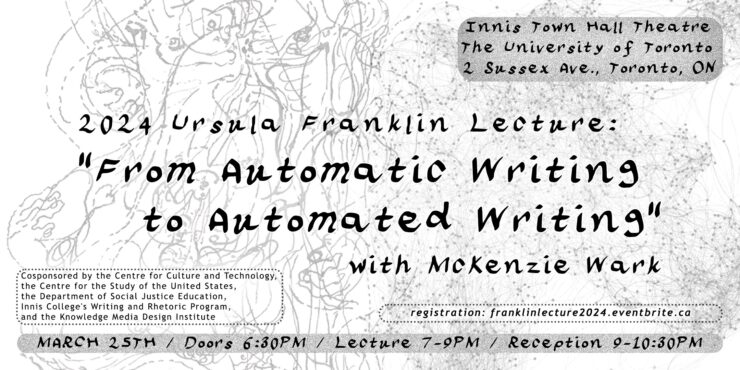The hype around AI writing challenges traditional notions of authorship. But what if an author is not the originator of the text? Through the upcoming Franklin Lecture, writer and scholar McKenzie Wark will discuss whether AI has really led to the creative liberation of writing and what it means for authorship.
Event Details:
Date: March 25
Time: Lecture from 7-9 pm
Book signing and reception to follow
Location: Innis Town Hall
Innis College, 2 Sussex Ave, Toronto, ON M5S 1J5
Register Here
Who is McKenzie Wark?
McKenzie Wark (Eugene Lang College, the New School) is known for her writing on critical theory, digital media, transgender studies, and autofiction. Her numerous works include A Hacker Manifesto (Harvard University Press, 2004), Gamer Theory (Harvard University Press, 2007), The Spectacle of Disintegration: Situationist Passages out of the Twentieth Century (Verso, 2013), Molecular Red: Theory for the Anthropocene (Verso, 2016), Capital is Dead: Is This Something Worse? (Verso, 2019), and Sensoria: Thinkers for the Twentieth-First Century (Verso, 2020). Most recently, Wark’s writing has engaged modes of authotheory and memoir, in Reverse Cowgirl (Semiotexte, 2019), Raving (Duke University Press, 2023), and Love and Money, Sex and Death (Verso, 2023).
The Franklin Lecture is cosponsored by the Centre for Culture and Technology, the Centre for the Study of the United States, the Department of Social Justice Education, Innis College’s Writing and Rhetoric Program, and the Knowledge Media Design Institute.
What’s the Franklin Lecture?
The Franklin Lecture is named after Ursula Franklin, who was a scholar, a scientist and an activist. She conducted research and taught at the University of Toronto for over 40 years and was the first female professor to receive the designation of University Professor (the university’s highest honour).
Professor Franklin was an expert in metallurgy and materials science, and primarily taught in the Faculty of engineering, but she was also interdisciplinary, both in her own work and in her impact. She was a member of the Science Council of Canada, where she contributed to several influential studies, including a truly landmark report outlining Canada’s responsibilities for combating environmental degradation published in 1977. In 1989, she delivered a Massey Lecture called The Real World of Technology, which was later turned into a bestselling book, which in turn became a foundational text across the many disciplines concerned with better understanding the relationship between technology and society.
Through her work in contemporary philosophy of technology, Professor Franklin made vital contributions to The Toronto School of thought, along with Harold Innis, Marshall McLuhan and Northrop Frye. Read more here.
Check out the previous Franklin Lecture
Black Software: Retrospect to Prospect by Dr. Charlton McIlwainby

